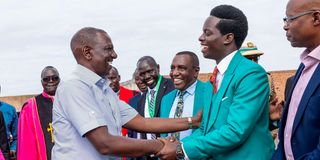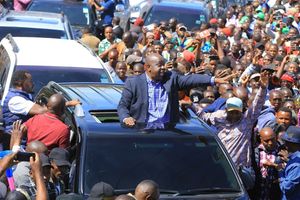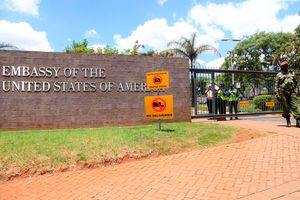
President William Ruto shares light moments with Kasmuel McOure during the opening of a new church sanctuary at AIC Kipkorgot in Uasin Gishu County on December 22, 2024.
The air is tense, and the streets are restless, not with the roar of protests this time, but with whispers of a new betrayal. Two former firebrands that sprouted as a consequence of the 2024 youth-led anti-Finance Bill protests are teasing their own youth-league handshake. We shall call these two Kasmuel McOure and Morara Kebaso for security reasons.
The Kasmuel-Morara handshake, a spectacle that’s got tongues wagging and timelines buzzing, isn’t the reunion of revolutionary comrades. It’s a masterclass in political sleight of hand, a grim reminder that in Kenya, the path to power, if nothing changes, has and will remain paved with sellouts.
Kasmuel, the sharp-tongued darling of the ODM Youth League, and Morara, the self-styled Gen Z messiah who was cozying up to the Wamunyoro crew just months ago, have clasped hands. But this isn’t about shared values. It is about survival, ambition, and the oldest trick in Kenyan politics: absorption.
Kasmuel’s move smells like a man scrambling to claw his way back into relevance. After hitching his wagon to ODM—a party that’s been neck-deep in President William Ruto’s regime until the political winds blown by its secretary-general, Edwin Sifuna, just recently started shifting—he’s found that the grass wasn’t as green as promised.
His once-fiery rhetoric, which lit up the anti-Finance Bill protests of 2024, now feels like a distant echo. The Gen Z faithful, who once hailed him as a voice of their rage, have turned cold painting him as a man adrift, clutching at Morara’s coattails to regain a foothold in a movement that’s already outgrown him. He’s not leading the charge anymore; he’s chasing it.
Personal fiefdom
Morara, by contrast, plays a sharper, uglier game. His Inject Party, launched with fanfare as a Gen Z vanguard, is less a movement than a personal fiefdom. Just a few months ago, he was thick with the Wamunyoro crew, whispering promises of reform. Now, he’s pivoted, attempting to style himself the kingpin of Kenya’s youth vote.
Outside of the Wamunyoro team ejecting his seat from the table, it’s very difficult to contemplate an ideological shift over a few months that has suddenly made him very clever. The issue with suddenly becoming clever, however, is that you sometimes forget that there are people who have been clever throughout. And they see through the charade, branding him a shape-shifter who moulds his ideals to the highest bidder. His clasp with Kasmuel isn’t about forging unity—it’s about hoarding influence, a currency he’ll trade for a piece of the loot when the political elite come knocking.
Kenya’s political machine thrives on this. The ruling class doesn’t need to crush dissent, or address its underlying grievances if they could just absorb it. Ruto’s coalition, stitched with Raila Odinga’s ODM and other strange bedfellows, is a testament to this alchemy. The Gen Z uprising of 2024, a leaderless blaze that shook the State, has been dimmed not by force but by co-option. The youth’s demands—justice, accountability, an end to tribal chess—were never going to survive the boardroom. The boardroom is meant to discuss looting—not values.
Kasmuel’s ODM ties and Morara’s party-building are not anomalies; they’re the system working exactly as intended, turning rebels into pawns for the right incentive.
Yet the rot runs deeper. The ideals that fuelled the protests, noble as they were, and while they resonate across the country, meet a population drenched in apathy. Decades of broken promises have bred a pragmatism that borders on cynicism. To many, politics is a hustle, not a crusade. And although most believe in it, very few are willing to apply themselves to the pursuit of the Kenyan utopia. The youth’s vision of a new dawn feels like a city-dweller’s fantasy to a population schooled in survival. This disconnect emboldens the Kasmuel-Morara archetype—figures who don’t need to inspire, only to manoeuvre.
Polished manifestos
This mess exposes a gaping wound in Kenya’s youth politics: a leadership vacuum. The Gen Z movement, for all its fire, lacks direction. It is a void that conmen are all too eager to fill. The imperfect, the principled, the overwhelmingly good, the ones who do what is right more than they do what isn’t are nowhere to be seen. And if they don’t step up, the best hustler will win. Kasmuel and Morara aren’t the answer; they’re the warning.
The youth who stormed Parliament, who buried their dead, didn’t bleed for this. They didn’t chant for handshakes or party logos. They demanded a Kenya that answers to its people. The political elite bet on their fatigue, their division, their despair. But the streets still pulse with defiance.
The embers of 2024 still glow. The youth movement, battered but unbowed, holds a power the elite can’t fully tame. The gap isn’t just a weakness—it is an invitation. The principled, the imperfectly good must rise, not with polished manifestos but with the courage to reject the sellout’s script.
Kenya’s history is littered with absorbed revolutions, but it is also marked by those who refused to bend. The streets still pulse with possibility, waiting for voices that don’t just shout but those that build.
The youth must outlast the hustlers, outsmart the system, and outgrow the cynicism that birthed this moment. If they don’t, Kasmuel and Morara won’t be footnotes—they’ll be the architects of a generation’s defeat. The fight for Kenya’s soul won’t be won in boardrooms or viral posts. It will be won in the stubborn, messy work of showing up, staying true and daring to demand more.










